| Srl | Item |
| 1 |
ID:
120997
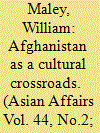

|
|
|
|
|
| Publication |
2013.
|
| Summary/Abstract |
Much has been written about Afghanistan, a complex cultural space that different people see in different ways. But not all of their views are of equal value. Stereotypes do no-one any favours. Ella Maillart and Annemarie Schwatzenbach were two Swiss women writers who set off for Afghanistan in June 1939. Ella was a traveller who wrote, Annemarie a writer who travelled, but their books give a sense of the realities of Afghanistan, Nancy Dupree first visited more than twenty years later than the two Swiss, but stayed involved for decades in a variety of different ways. She accepted and coped with the fact that the country was changing and would change still further.
|
|
|
|
|
|
|
|
|
|
|
|
|
|
|
|
| 2 |
ID:
103631
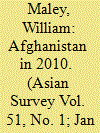

|
|
|
|
|
| Publication |
2011.
|
| Summary/Abstract |
Afghanistan in 2010 witnessed a number of important events including cabinet changes, legislative elections, and several major international conferences focused on its problems. It continued to be confronted by long-term problems of insecurity, compounded by uncertainty about both the trajectory of U.S. policy and the legitimacy of its own rulers.
|
|
|
|
|
|
|
|
|
|
|
|
|
|
|
|
| 3 |
ID:
113911
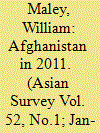

|
|
|
|
|
| Publication |
2012.
|
| Summary/Abstract |
Afghanistan confronted further turbulence in 2011, involving the assassinations of prominent figures, tense regional relations, and uncertainty about where the draw down of foreign forces in Afghanistan might lead. Popular confidence in Afghanistan's future direction remains weak, and President Hamid Karzai has had little success in boosting his government's standing.
|
|
|
|
|
|
|
|
|
|
|
|
|
|
|
|
| 4 |
ID:
052425
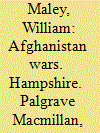

|
|
|
|
|
| Publication |
Hampshire, Palgrave Macmillan, 2002.
|
| Description |
ix, 340p.hbk
|
| Standard Number |
033380290X
|
|
|
|
|
|
|
|
|
|
|
|
Copies: C:1/I:0,R:0,Q:0
Circulation
| Accession# | Call# | Current Location | Status | Policy | Location |
| 046613 | 958.1045/MAL 046613 | Main | On Shelf | General | |
|
|
|
|
| 5 |
ID:
147642
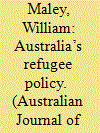

|
|
|
|
|
| Summary/Abstract |
Refugee policy involves a two-level game. For Australia since approximately 1998, the politics of refugees has been toxically affected by domestic politics. This has had potentially negative effects on Australia’s reputation and soft power. This article provides an overview of the issue, explores the ways in which considerations of domestic politics have come increasingly to shape Australia’s policy and concludes with a discussion of the consequences of Australia’s treatment of refugees for its diplomacy and soft power.
|
|
|
|
|
|
|
|
|
|
|
|
|
|
|
|
| 6 |
ID:
115337
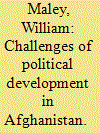

|
|
|
|
|
| Publication |
2011.
|
| Summary/Abstract |
The transition in Afghanistan is manifestly beset by multiple challenges, yet behind obvious issues such as insecurity and corruption lie a range of deeper problems related to the way in which the Afghan political system has developed. Trust deficits, real conflicts of interest, and parallel and potentially conflicting systems of authority, have affected both the mass population-many of whom feel disconnected and disenfranchised-and political elites, which remain severely divided. The combination of a presidential system with a highly centralized formal state structure had fostered patrimonialism at the expense of institutional development. Unless and until these problems are addressed, the likelihood that any Afghan government will be able to take the lead in confronting the country's problems remains low.
|
|
|
|
|
|
|
|
|
|
|
|
|
|
|
|
| 7 |
ID:
007424
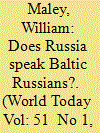

|
|
|
|
|
| Publication |
1995.
|
| Description |
4-6
|
|
|
|
|
|
|
|
|
|
|
|
|
|
|
|
| 8 |
ID:
048491
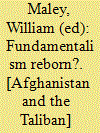

|
|
|
|
|
| Publication |
London, C. Hurst and Co., 1998.
|
| Description |
xiii, 253p.
|
| Standard Number |
1850653607
|
|
|
|
|
|
|
|
|
|
|
|
Copies: C:1/I:0,R:0,Q:0
Circulation
| Accession# | Call# | Current Location | Status | Policy | Location |
| 040263 | 320.9581/MAL 040263 | Main | On Shelf | General | |
|
|
|
|
| 9 |
ID:
163222
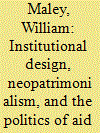

|
|
|
|
|
| Summary/Abstract |
State disruption confronted Afghanistan’s rulers and their international supporters with a challenging legacy after 2001. The emergence of a neopatrimonial political order, with formal bureaucratic and administrative structures entwined with informal networks and patronage, has significantly affected attempts at aid delivery. Such dangers need to be recognized and addressed at the outset in internationally supported transitions
|
|
|
|
|
|
|
|
|
|
|
|
|
|
|
|
| 10 |
ID:
089782
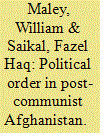

|
|
|
|
|
| Publication |
Boulder, Lynne Rienner Publisher, 1992.
|
| Description |
80p.
|
| Series |
International peace academy occasional paper series
|
| Standard Number |
1555873618
|
|
|
|
|
|
|
|
|
|
|
|
Copies: C:1/I:0,R:0,Q:0
Circulation
| Accession# | Call# | Current Location | Status | Policy | Location |
| 054308 | 320.9581/MAL 054308 | Main | On Shelf | General | |
|
|
|
|
| 11 |
ID:
074676
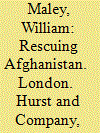

|
|
|
|
|
| Publication |
London, Hurst and Company, 2006.
|
| Description |
176p.hbk
|
| Standard Number |
1850658463
|
|
|
|
|
|
|
|
|
|
|
|
Copies: C:1/I:0,R:0,Q:0
Circulation
| Accession# | Call# | Current Location | Status | Policy | Location |
| 051866 | 958.1046/MAL 051866 | Main | On Shelf | General | |
|
|
|
|
| 12 |
ID:
124146
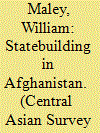

|
|
|
|
|
| Publication |
2013.
|
| Summary/Abstract |
The process of statebuilding in Afghanistan since 2001 has been complicated by a diverse set of problems, including the unintended consequences of early political decisions, the choice of institutional forms that have fostered dysfunctional policy-making, and the slide towards a neopatrimonial system combining bureaucracy with patronage. These problems have had a corrosive effect on the statebuilding enterprise, leaving an ambiguous legacy as Afghanistan proceeds towards one of the most challenging phases of its modern history.
|
|
|
|
|
|
|
|
|
|
|
|
|
|
|
|
| 13 |
ID:
060677
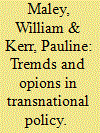

|
|
|
| 14 |
ID:
192084
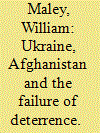

|
|
|
|
|
| Summary/Abstract |
Russia’s 2014 seizure of the Crimean Peninsula in Ukraine highlighted the limitations of a ‘rules-based’ international order in protecting a state’s territorial integrity in the face of threats to international peace and security resulting from the actions of a permanent member of the United Nations Security Council. With the capacity to veto any Security Council resolution authorising ‘enforcement action’ under Article 42 of the United Nations Charter, Russian leaders only had to fear the exercise under Article 51 of Ukraine’s inherent right of individual or collective self-defence. But Ukraine was in no position to drive Russian forces from Crimea unless supported by a great power such as the United States, and as Lawrence Freedman put it, ‘President Obama made it clear that he saw no circumstances in which the United States would use armed force in connection with this crisis’ (Freedman Citation2019, 106). The focus of the international response would instead be on extended deterrence of future Russian aggression.
|
|
|
|
|
|
|
|
|
|
|
|
|
|
|
|
| 15 |
ID:
057111
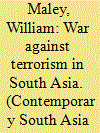

|
|
|